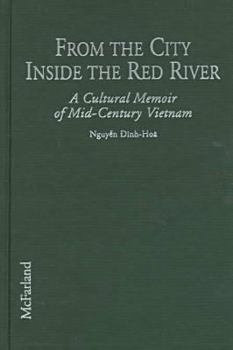From the City Inside the Red River: A Cultural Memoir of Mid-Century Vietnam
Born on January 17, 1924, Nguyen-Dinh-Hoa grew up in Hanoi never imagining the war that would ultimately divide his country and throw the region into chaos. As he grew into manhood, he witnessed... This description may be from another edition of this product.
Format:Library Binding
Language:English
ISBN:0786404981
ISBN13:9780786404988
Release Date:January 1999
Publisher:McFarland & Company
Length:217 Pages
Weight:1.00 lbs.
Dimensions:0.7" x 6.3" x 9.3"
Customer Reviews
2 ratings
Vietnam Personalized
Published by Thriftbooks.com User , 24 years ago
In 1954, two members of the Ecole Francaise d'Extreme Orient published a commendable scholarly work titled: Connaissance du Viet-Nam. Pierre Huard and Maurice Durand meticulously, but not laboriously, capsulized Vietnamese geography, history, education, agriculture, family relations, literature, and music, amid many other topics. Their essential thesis was that this economically impoverished nation has a bountiful cultural heritage.Almost half a century elapsed before a work of comparable revelation emerged in English. The late and noted lexicographer Nguyen Dinh Hoa's cultural memoir proves the Huard and Durand thesis. The memoir focuses on Vietnamese customs and mores as the author experienced them growing up in Hanoi: Lining up for water at the community well; collection of night soil, a friend's accuracy with the slingshot, sleeping under a mosquito net, introduction to the martial arts at ten, burial of the placenta and umbilical cord, silversmithing techniques, and marketing of the urine of a pre-pubescent boy as a tonic. This personalized approach humanizes and vivifies what otherwise might have been dry text.Hoa either had total recall or was the most fastidious keeper of a journal since Samuel Pepys. He lists the names and characteristics of his grade school teachers, and describes the menu offered to him on his arrival in New York in 1948. Woe to anyone who met Hoa since Hoa was five years old, and couldn't remember Hoa's name, for he surely would have remembered yours. Particularly for someone who spoke no English until his early twenties, he manifested a remarkable grasp of English idiom and nuance. In all the memoir's two hundred pages, only four slightly infelicitous expressions emerge. None interferes with meaning, and they are all too petty to elaborate on here. This fabled memoir is an argument for nature over nurture. Hoa came from an illustrious family in which, for several generations, all the males have been named Nguyen Dinh this or that. In fact, in the memoir, the reader sometimes gets lost in the forest of Nguyen Dinh's.The memoir is wisely non-linear. It does not pass directly from birth through adolescence to maturity, but skips entertainingly back and forth in time. For example, we learn about Mit, Hoa's wife, through her encounter with a stereotypically uncomprehending official of the U.S. Immigration and Naturalization Service, long before he tells us of their early betrothal.Hoa's memoir is a revelation of the richness and humanity of Vietnamese culture, and a a welcome antidote for those whose image of Vietnam is shaped by Oliver Stone and Stanley Kubrick.
Everything That Flows Must Converge
Published by Thriftbooks.com User , 24 years ago
As a linguist, and also someone steeped in the history of Vietnam, no doubt Dr. Nguyen Dinh-Hoa has thought deeply about the symbolic significance of "Ha-Noi," named for Vietnam's northern capital. As the cradle of Vietnamese civilization, it literally means "the city inside the Red River," hence the title of the book. The word "Noi" in Vietnamese denotes "inside" and suggests either insulation or introspection. The word "Ha" on the other hand, means "river" and suggests flow, confluence, and change. In fact, Dutch, Portuguese, and British merchants in the 16th century had referred to the bustling city by the Red River as "Ke Cho" or "The Market Place." Thus, in the very title of Dr. Nguyen's work, "From the City inside the Red River," there exists already a tension between tradition and change--the tension that defines the essence of Vietnamese culture. In his book, Dr. Nguyen covers at length the history and geography of Hanoi, or "The Old Capital" of Vietnam from the 11th century to the 19th century. At the same time, he weaves his personal history into the larger tapestry of his native city. The street where he was born and lived until early adulthood is at once imbued with rich historical context and future portent. It is called to this day "Pho Hang Bac" meaning "Silver Street." The French called this street "Rue des Changeurs" ("Moneychangers' Street.") It is one of the oldest streets in Hanoi and used to serve as the financial center of ancient Vietnam. Like Hanoi, Silver Street embraces both the Old World, and the change brought by commerce with the New World. In Dr. Nguyen's memoir, historical changes occurred side by side with personal changes. Dr. Nguyen mentioned the Confucian tradition of "rectifying names," i.e., the formal ritual of changing a person's given birth name to mark the karmic change that transforms his or her personal essence. Dr. Nguyen translates this symbolic tradition into a loose American colloquialism, i.e., "how not to call a spade a spade." Dr. Nguyen's first name, Hoa, was given to him by his father, which means "The Peace-Loving One." In 1948, Dr. Nguyen received a scholarship to study at Union College, in Schenectady, New York. He was sponsored by Delta Upsilon Fraternity through a Union College Program called H.E.L.P. (Higher Education for Lasting Peace.) Delta Upsilon brothers immediately rechristened him "Wing-Ding," possibly a phonetic equivalent of his family name, "Nguyen Dinh." Ironically, the word "Wing-Ding" in American slang means an outburst, or a wild and raucous party, a meaning, and name that represents the direct opposite of Hoa, "the peace-loving one." As a fateful name, however, it captures perfectly the dual nature of Dr. Nguyen--an open, adventurous stranger in a strange land. In the dawn of post-war America, his new name "Wing-Ding" conjured up an aura of singsong childishness--perhaps unintended condescension-- if not racism, f





